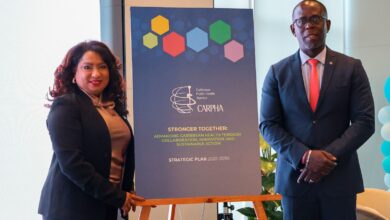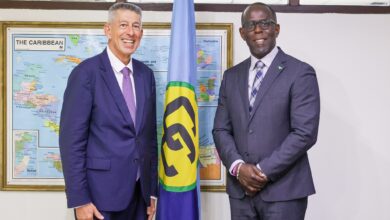Her Excellency Patricia Espinosa, Foreign Minister of the United Mexican States
His Excellency Fernando Sandoval, Plenipotentiary Representative of the United Mexican States to the Caribbean Community
Other distinguished Representatives of the Government of the United Mexican States
Distinguished delegates of CARICOM
Other Distinguished Guests
Representatives of the Media
Ladies and Gentlemen
Allow me at the very outset to express my appreciation to the Government of Mexico for the warm welcome extended to the Caribbean Community (CARICOM) delegations on our arrival here.
Having not visited Mexico for some time now, it is a pleasure for me to be here in this beautiful city once again. My pleasure is also matched by the distinct honour afforded me as Secretary-General of the Caribbean Community to participate in this Fifth CARICOM-Mexico Joint Commission, an occasion which will no doubt see a further strengthening and solidifying of the deep bonds of friendship and the collaborative ties which CARICOM and Mexico have enjoyed over the past several years. The presence of so many of our CARICOM Member States is testimony to the high regard in which we hold this relationship.
In commending the Government of Mexico, for hosting this Joint Commission I must also express our appreciation for its initiative to further expand the existing ties of cooperation by convening the First CARICOM-Mexico Business Forum. The Business Forum, I believe, represents a very practical way of translating into concrete action many of the ideas and proposals for expanded economic, trade and investment relations which the two sides have sought to develop over the years.
It is therefore our fervent hope that the focused sessions and dialogue tomorrow will provide an opportunity to explore in greater depth, the possibilities for creating and exploiting new and existing business opportunities between Mexico and the CARICOM Region. This is very important to our Community as we continue, through the establishment of the CARICOM Single Market and Economy, to create an environment which is conducive to increasing the competitiveness of our products, to identifying new markets for these products, and to encouraging more foreign direct investment. Given the current global economic environment nothing can be more important.
But returning to today’s event, I am indeed excited at the Agenda we have before us for this Fifth Joint Commission. I feel confident that it will stimulate a fruitful dialogue between CARICOM and Mexico on the scope for strengthened cooperation in a wide-ranging number of areas.
That confidence is the fruit of experience-an experience which finds its roots in the 1974 signing of the Agreement establishing the CARICOM-Mexico Joint Commission, making Mexico the first country to establish a Joint Commission with CARICOM. From that beginning we have experienced a process of significant benefit. We in CARICOM have benefited from projects which have resulted in the strengthening of regional institutions, the enhancement of human resource development, and the fostering of new research and development areas within the Region. For these we are deeply grateful. I need not delay you by iterating the benefits which Mexico on its part has enjoyed.
During the course of this Fifth Joint Commission, it is our hope that we will be able to significantly advance the discussions on a number of project proposals which have been pending for some time in areas such as capacity building, tax policy design, and statistical development. We will also hope to engage in discussions on other potential areas for future cooperation, including air and maritime transport, agriculture, climate change, health, and crime and security. All of these areas are of critical importance to the livelihood, well-being, and in some cases, the very survival of the peoples of our hemisphere.
The Community particularly welcomes the opportunity to re-engage Mexico on the issue of energy conservation. Now that the CARICOM Secretariat has established an Energy Unit we are better placed to advance our cooperation in relation to Regional Energy Policy as was foreseen in the Final Act of the Fourth Joint Commission. Given the Region’s high level of energy insecurity, I cannot over-emphasize the importance of this issue.
CARICOM also looks forward to meaningful discussions on CARICOM-Mexico collaboration in the international political arena. As members of the same hemisphere, Mexico and the Member States of CARICOM share a common space, a number of common concerns and common challenges. Not surprisingly we share membership in a number of regional and hemispheric bodies and processes such as the OAS, the ACS, the Rio Group, the EU-LAC process all of which contribute to the promotion of peace, security and sustainable development of our societies.
These commonalities are today no more evident than with respect to the thorny issues of the global financial and economic crisis, Climate Change and security all of which critically require not only hemispheric but global cooperation. CARICOM and Mexico have a unique role to play in this regard.
Ladies and Gentlemen I cannot close without applauding Mexico, a founding member of the United Nations for its continued active participation in the work of the Organs of the UN System and for the leadership role it has played within the GRULAC, the Grouping of Latin America and Caribbean Countries. Mexico’s active role within these bodies have generally been beneficial to the Member States of the Caribbean Community. We confidently expect that today’s deliberations will be significantly so.
Ladies and Gentlemen in closing I once again extend our sincere thanks and appreciation to our host for the excellent arrangements made for our meeting and extend our sincere appreciation for the kind hospitality extended to us during our stay.





